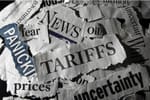Managing personal finances can be challenging, especially during periods of economic uncertainty.
Inflation impacts the cost of living, making it crucial to find innovative ways to maximize your budget without sacrificing essential needs.
By adopting smart financial strategies, you can alleviate the pressure of rising prices and maintain your lifestyle.
Whether it's making small, everyday changes or strategic long-term plans, discover how you can effectively stretch your budget.
Read on to uncover practical tips that will empower you to make the most of your money, even as economic hurdles arise.
1)) Track Your Spending
One of the most effective ways to control your financial situation is to diligently track your spending.
By keeping a detailed record of every expense, from daily coffee runs to monthly utility bills, you'll gain a clear understanding of where your money is going.
Numerous tools and apps are available to make this task straightforward, allowing you to categorize expenditures and identify areas where you could cut back.
Tracking your spending not only highlights your financial habits but also helps you set realistic budgets and savings goals.
Over time, this practice will enable you to make more informed financial decisions, leading to greater financial stability and peace of mind.
Implementing a printable monthly bill tracker into your financial routine can be a game-changer when navigating the challenges of inflation.
This simple yet effective tool allows you to map out your recurring expenses, ensuring that nothing falls through the cracks.
By visually organizing your bills on paper, you can easily spot trends, prioritize priority payments, and identify opportunities to reduce costs.
A well-maintained bill tracker serves as a constant reminder of your financial commitments, helping you make timely payments and avoid late fees.
Embrace this proactive approach to budgeting and take control of your finances today by downloading a printable monthly bill tracker.
2)) Create A Detailed Budget
Creating a detailed budget is a fundamental step in gaining control over your finances.
Start by listing all your sources of income and categorizing your expenses into fixed and variable costs.
This comprehensive overview will help you understand your financial flow and pinpoint areas that may require adjustments.
Consider incorporating both short-term and long-term goals into your budget to keep your financial planning dynamic and forward-looking.
With an accurate budget in place, you can allocate your funds more effectively, ensuring that necessities are covered while still allowing for savings and discretionary spending.
A well-structured budget not only enhances your financial awareness but also empowers you to make confident and strategic financial choices, thereby improving your overall financial well-being.
3)) Prioritize Needs Over Wants
In times of financial constraint, learning to differentiate between needs and wants is crucial to maintaining a balanced budget.
Prioritizing essential needs such as housing, food, healthcare, and transportation ensures that the most critical aspects of your life are met first.
By recognizing what constitutes a genuine need, you can steer clear of unnecessary expenditures that may jeopardize your financial stability.
Train yourself to assess each potential purchase with an eye toward long-term benefits rather than immediate gratification.
This disciplined approach not only safeguards your financial health but also instills a deeper appreciation for the resources you do have.
By consistently focusing on needs over wants, you ensure that your financial decisions support your essential priorities, laying a strong foundation for sustainable financial management.
4)) Cut Unnecessary Subscriptions
One effective way to reduce your monthly expenses is by cutting unnecessary subscriptions.
With the plethora of services available today—ranging from streaming platforms to monthly delivery boxes—it's easy to accumulate more subscriptions than you truly need or use.
Start by reviewing each service and assessing how frequently you use it and whether it aligns with your current priorities and lifestyle.
Trustworthy alternatives may offer more affordable options or free trials that can temporarily meet your needs without additional costs.
By eliminating subscriptions that no longer provide value, you can redirect those funds to more pressing budgetary requirements or increase your savings.
This practice does more than just trim expenses; it also refines your spending habits, ensuring that your subscription dollars are aligned purposefully with your enjoyment and utility.
5)) Use Coupons And Discounts
Leveraging coupons and discounts is an excellent strategy to maximize your purchasing power without straining your financial resources.
With the variety of digital platforms and applications now available, finding coupons and discounts has become highly accessible and efficient.
You can often discover price reductions on everything from groceries to apparel and even travel.
Make it a habit to check for available deals before making any purchase, whether online or in-store.
Subscribing to newsletters or joining loyalty programs can also yield exclusive offers.
By systematically applying these savings options, you ensure that your expenditure offers the best value possible.
Over time, these savings accumulate, allowing you to allocate funds toward savings or other financial goals, enhancing your overall economic resilience and freedom.
6)) Buy In Bulk
Buying in bulk can be a highly effective way to reduce unit costs and save money in the long term.
When you purchase larger quantities of items, such as household essentials, pantry staples, or toiletries, you often benefit from a lower price per unit compared to smaller packages.
This strategy not only helps in minimizing trips to the store, thus saving on transportation costs but also ensures that you have a steady supply of necessities, reducing the likelihood of paying premium prices during emergencies.
Make sure to plan your purchases wisely by focusing on non-perishable goods and those with a long shelf life.
By stocking up strategically, you can avoid the pitfall of overbuying items that may expire or go to waste.
Embracing this practice can significantly ease financial strain and allow you to redirect savings toward other meaningful financial priorities, promoting greater economic efficiency and security.
7)) Shop For Store Brands
Opting for store brands over popular name brands can lead to substantial savings while still providing quality products.
Many store-branded items are manufactured by the same companies that produce their brand-name counterparts, often with minimal differences in ingredients or materials.
By choosing store brands, you benefit from the lower marketing and packaging costs that are passed on to consumers, allowing for lower prices.
It is advisable to test a few store-brand products to gauge their quality and suitability for your needs, which could include anything from groceries to household supplies.
This approach not only stretches your budget but also offers surprisingly effective alternatives to more expensive options.
Regularly incorporating store brands into your shopping routine empowers you to consistently reduce expenditure without sacrificing quality, thereby maintaining a well-balanced and economical household budget.
8)) Limit Dining Out
Limiting dining out is a significant step toward tighter financial control and improved health outcomes.
Home-cooked meals generally cost less and offer greater nutritional value, as you can manage ingredient quality and portion sizes.
By reducing restaurant visits, you save not only on the meal itself but also on related costs like tips and transportation.
Meal planning is an effective way to ease into this habit; it allows you to purchase ingredients in advance, reducing spur-of-the-moment dining expenses.
Exploring new recipes can make home cooking exciting and satisfying.
By curbing the frequency of eating out, you can redirect those funds to vital financial goals or healthful household groceries.
This practice eventually creates a mindful approach to both spending and eating habits, contributing to a more balanced lifestyle.
9)) Set Savings Goals
Setting savings goals is a fundamental component of effective financial planning.
By clearly defining your savings objectives, whether they're for an emergency fund, a dream vacation, or a down payment on a home, you create a roadmap that directs your financial decisions and spending habits.
It’s beneficial to break larger goals into smaller, more manageable milestones, as this provides a sense of achievement and keeps you motivated as you progress.
Automating savings through direct deposits or apps can also help ensure consistency, making the saving process effortless and habitual.
Regularly reviewing and adjusting your savings goals is crucial, especially in response to significant life changes or financial circumstances.
Consistently setting and striving toward savings goals empowers you to take charge of your financial future and enhances your ability to achieve long-term success and stability.
10)) Reduce Energy Consumption
Reducing energy consumption is an effective way to decrease household expenses and lessen your environmental impact.
By implementing simple measures, such as turning off unnecessary lights, unplugging unused electronics, and using energy-efficient appliances, you can significantly cut down on electricity bills.
Investing in smart thermostats or programmable devices enables precise temperature control, conserving energy while maintaining comfort.
Upgrading to LED lighting or insulating windows are other practical strategies that enhance efficiency.
These changes, while often small and incremental, accumulate substantial financial savings over time.
Cultivating habits that prioritize energy conservation not only supports a sustainable lifestyle but also directs saved resources toward other critical financial goals, fostering an overarching sense of responsibility and stewardship.
Conclusion
Incorporating these strategies into your financial routine can transform your economic landscape, promoting both stability and growth.
Each step, from smart shopping and meal planning to setting savings goals and reducing energy use, contributes to a comprehensive approach to financial health.
By making mindful decisions and prioritizing resourceful habits, you afford yourself greater freedom to focus on what truly matters.
The cumulative effect of these changes not only bolsters your financial resilience but also enhances your quality of life, paving the way for a more secure and prosperous future.
Download Our Free E-book!







